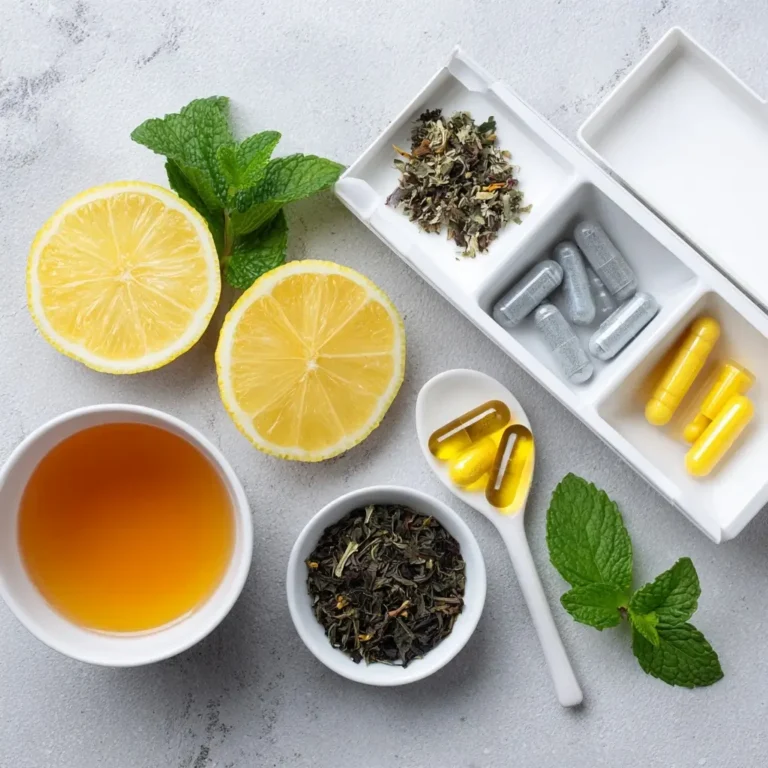I still remember the first time I stumbled upon berberine. I was scrolling through TikTok one sleepy Sunday morning when video after video claimed it was “Nature’s Ozempic.” Curious, I dove into the research, and soon I had a bottle of golden capsules in my pantry. What began as a casual experiment turned into something I now recommend to friends asking for natural support on their weight journey.
Let’s be honest: when the cost of Ozempic started skyrocketing and shortages became the norm, many of us looked for something accessible, affordable, and clean. Enter berberine. This powerful herbal supplement has quietly been used in traditional medicine for centuries, but now it’s gone viral for its GLP-1-like effects, helping people manage blood sugar and shed pounds naturally.
The buzz around berberine is real—and with over 90 million TikTok views, this herb isn’t just hype. It’s being used in kitchens and routines alongside natural aids like natural Ozempic recipes and even simple blends like blue tonic drinks for weight loss. But what makes it so effective? And how do you actually use it?
Table of Contents
How Berberine Became “Nature’s Ozempic”
The GLP-1 Alternative Everyone’s Talking About

Berberine is an alkaloid compound extracted from various plants like barberry and goldenseal. What makes it interesting is how it interacts with the body’s metabolic system. Similar to prescription GLP-1 agonists, berberine activates AMPK (AMP-activated protein kinase), often dubbed the “metabolic master switch.”
This activation helps regulate blood sugar, support fat metabolism, and reduce insulin resistance. In other words—it tackles many of the root causes that make weight loss hard. That’s why it’s catching fire as a natural alternative to prescription injections.
In many ways, it pairs naturally with detox strategies already popular on wellness blogs. For example, stacking berberine with lemon or apple cider vinegar-based drinks may enhance its benefits by aiding digestion and insulin response after meals.
Why It’s Trending Now (and for Good Reason)
Let’s face it—Ozempic isn’t cheap. And the shortage? Frustrating. With influencers, nutritionists, and even doctors weighing in on berberine’s power, it’s no surprise people are trying it out. The appeal lies in its over-the-counter availability and lower risk of side effects when taken correctly.
Plus, the lifestyle alignment is real. Many folks are pairing it with natural Mounjaro-style tea blends or pink salt routines to support hydration, energy, and metabolism while on a weight loss journey. It’s about finding a strategy that feels both grounded and gentle—and berberine fits right into that framework.
Berberine isn’t just another pill; it’s part of a new wave of whole-body health that’s emerging from our pantries, not pharmacies.
How to Take Berberine Safely and Effectively
Understanding Berberine Dosage and Timing
When it comes to berberine, timing and dosage matter more than people think. Most successful users take between 900–1500 mg per day, typically split into 2–3 doses to avoid stomach upset and maximize absorption. Why split it? Because berberine has a short half-life, meaning it doesn’t stay in your system long.
A common and effective routine is 500 mg before meals, especially lunch and dinner. This approach mirrors how many take GLP-1 agonists—targeting the body’s insulin and blood sugar spikes when food is consumed. Just like with baking soda detox drinks for weight loss, timing it with meals can amplify the effects.
Tip: Always check the label for third-party testing and avoid brands that use fillers. Quality matters when you’re taking something daily.
Best Practices for Combining Berberine with Natural Aids
While berberine works well on its own, many people combine it with supportive natural drinks or habits to boost results. Hydration, detoxification, and gut support can help your body better respond to metabolic changes. Pairing it with lemon balm detox recipes or sipping pink salt and lemon water can enhance hydration and support adrenal balance.
These combinations aren’t just trendy—they’re practical. Berberine may slightly lower blood sugar, so hydrating well and eating nourishing whole foods (especially fiber-rich meals) can reduce side effects like dizziness or cravings.
Here’s a breakdown of popular natural pairings:
| Natural Aid | Benefit When Paired with Berberine |
|---|---|
| Pink Salt + Lemon Water | Supports electrolyte balance & digestion |
| Apple Cider Vinegar | Improves insulin sensitivity post-meals |
| Lemon Balm or Mint Teas | Soothes digestion, reduces bloat |
| High-Fiber Smoothies | Slows glucose absorption & supports gut health |
Berberine vs. Ozempic and Other Natural Alternatives
Can Berberine Really Replace Ozempic?
Let’s get real—berberine isn’t a pharmaceutical. It won’t deliver the same overnight results some people experience with GLP-1 injections. But it wasn’t meant to. What berberine does offer is steady, sustainable support for blood sugar and weight management—without needles, prescriptions, or outrageous costs.
Studies show berberine can perform similarly to metformin (another insulin-sensitizing drug) in managing blood glucose and improving body composition. While Ozempic reduces appetite more aggressively, berberine supports metabolism at the root, often with fewer side effects.
And unlike prescription options, you can combine it with detoxifying, nutrient-rich drinks like the Natural Mounjaro Recipe or Natural Ozempic Tea. These work synergistically with berberine to enhance digestion, hydration, and fullness signals.
If you’re someone who prefers gradual change and fewer risks, berberine offers a reliable, budget-friendly path.
How It Compares to Other Natural Viral Weight-Loss Trends
With everyone hopping on trends like salt water flushes, coffee loopholes, or turmeric detox drinks, where does berberine fit?
Let’s break it down in another quick table.
| Trend | How It Works | Berberine Comparison |
|---|---|---|
| Pink Salt Trick | Boosts hydration & adrenal support | Berberine supports cellular energy more directly |
| Turmeric Drinks | Anti-inflammatory; supports gut health | Can pair well with berberine for gut and metabolic harmony |
| Apple Cider Vinegar | Improves blood sugar post-meal | Berberine works similarly—often more powerfully |
| Coffee Loophole | Suppresses appetite | Berberine has broader metabolic effects beyond appetite |
What sets berberine apart? It’s not just another viral shortcut. It’s backed by both traditional use and modern science. That combo gives it lasting power—and a spot in the routines of people looking to feel good from the inside out.
Is Berberine Safe? Side Effects and What to Know
Common Side Effects (and How to Avoid Them)

Berberine is generally well-tolerated, especially when compared to synthetic medications. But that doesn’t mean it’s side-effect-free. Some users report digestive issues—bloating, gas, or mild cramping—especially when starting with high doses. This is why starting low (300–500 mg per meal) and increasing gradually is key.
Fatigue or light-headedness can also occur if blood sugar drops too low—especially for those on existing medications for diabetes or insulin resistance. Pairing berberine with food, and staying hydrated with mineral-rich drinks like the Natural Mounjaro recipe, can help minimize this.
It’s not about fear—it’s about being smart and listening to your body, just like you would when trying new routines like pink salt water detoxes.
Who Shouldn’t Take It (and When to Talk to Your Doctor)
While berberine is natural, it’s still powerful. Certain people should avoid or closely monitor its use:
- Pregnant or breastfeeding women – It can affect the placenta and breast milk; not recommended
- People taking metformin or insulin – May lower blood sugar too much
- Anyone with liver conditions – Berberine is metabolized in the liver, so extra caution is wise
- Young children – Not enough research supports use in kids
If you’re already managing a health condition, consult a practitioner who understands herbal supplements before diving in.
For most healthy adults, berberine is a safe, low-risk tool in a weight management and wellness routine—as long as you respect its strength.
FAQs: Berberine (“Nature’s Ozempic”)
What is berberine and what does it do for weight loss?
Berberine is a natural compound that helps regulate blood sugar, reduce insulin resistance, and support fat metabolism—factors that contribute to weight loss.
Is berberine better than Ozempic?
It depends on your goals. Berberine is slower-acting and gentler, while Ozempic is a powerful prescription drug. Berberine is affordable, natural, and available over the counter.
How long does berberine take to work?
Many users notice improved digestion and appetite control within 1–2 weeks, with more visible weight loss or body composition changes appearing around 4–8 weeks.
Can I take berberine with other natural remedies?
Yes—many pair it with lemon water, herbal teas, or ACV to support digestion and metabolism. Always introduce one change at a time to track how your body responds.
Final Thoughts: Should You Try Berberine?
If you’ve felt priced out or burned out by prescription options, berberine offers a steady, powerful, and natural alternative. It’s not a magic pill—but it’s certainly a smart one.
Whether you’re pairing it with apple cider vinegar routines, detox drinks, or a clean eating plan, it can be your ally in finding balance—inside and out.
Looking for more daily natural hacks? Follow our Pinterest page to discover new drink recipes, safe trends, and natural health tools worth trying.
This content is for informational purposes only and not intended as medical advice. Always consult with a healthcare provider before starting any supplement.
Print
Berberine “Nature’s Ozempic”
- Total Time: 2 minutes
- Yield: 1 serving 1x
Description
Learn how to take Berberine effectively as a natural weight-loss aid—dubbed Nature’s Ozempic. Supports metabolism, blood sugar, and fat loss.
Ingredients
500mg berberine capsules
Filtered water or detox tea
Optional: 1 tsp apple cider vinegar or lemon juice
Glass or shaker cup
Instructions
Step 1: Take 500mg berberine with your largest meal (usually lunch)
Step 2: Take another 500mg dose with dinner
Step 3: Repeat this routine daily for at least 30 days
Step 4: Combine with hydration like lemon water or herbal teas
Step 5: Eat balanced, fiber-rich meals to support absorption
Notes
Start with one 500mg dose daily if you’re new to berberine
Avoid taking it on an empty stomach to prevent nausea
Consult a professional if you’re on blood sugar medications
Hydration and clean eating support better results
- Prep Time: 2 minutes
- Cook Time: 0 minutes
- Category: Wellness Routine
- Method: Supplement Routine
- Cuisine: Natural Remedies
Nutrition
- Serving Size: 1 routine
- Calories: 5
- Sugar: 0g
- Sodium: 0mg
- Fat: 0g
- Saturated Fat: 0g
- Unsaturated Fat: 0g
- Trans Fat: 0g
- Carbohydrates: 1g
- Fiber: 0g
- Protein: 0g
- Cholesterol: 0mg

